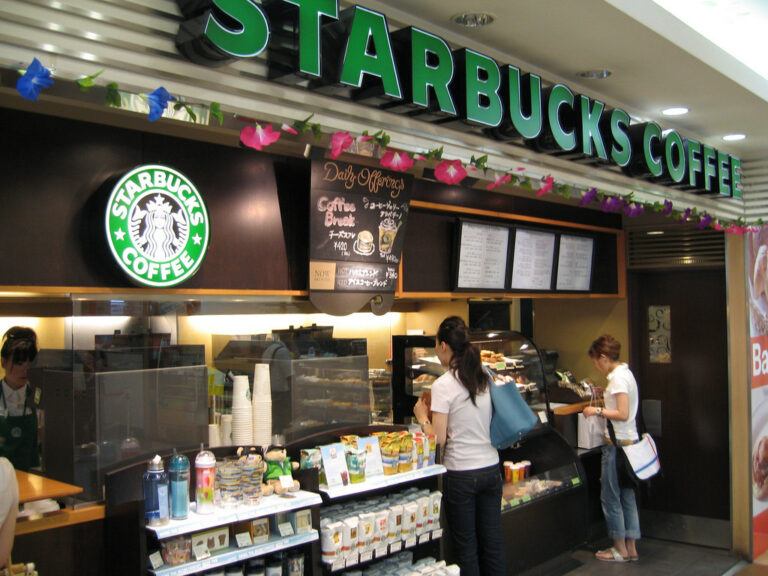Since the announcement about Bakkt by Intercontinental Exchange (ICE) on 3 August 2018, many reports have suggested that Starbucks is getting ready to accept Bitcoin payments. But are these claims valid? This article takes a closer look at this announcement to discover the truth about Starbucks and crypto payments.
The press release by ICE (the parent company of the New York Stock Exchange), the second-largest owner of financial exchanges (by revenue) in the world, said that ICE “plans to form a new company, Bakkt, which intends to leverage Microsoft cloud solutions to create an open and regulated, global ecosystem for digital assets”, and that it is partnering with Microsoft, Boston Consulting Group, Starbucks, and others to “create an integrated platform that enables consumers and institutions to buy, sell, store and spend digital assets on a seamless global network.”
The press release also contained this quote from Maria Smith, Vice President, Partnerships and Payments for Starbucks:
“As the flagship retailer, Starbucks will play a pivotal role in developing practical, trusted and regulated applications for consumers to convert their digital assets into US dollars for use at Starbucks… As a leader in Mobile Pay to our more than 15 million Starbucks Rewards members, Starbucks is committed to innovation for expanding payment options for our customers.”
Naturally, this announcement created a great deal of excitement amongst crypto enthusiasts, traders/investors, reporters, and analysts. In fact, as reported by CryptoGlobe, Brian Kelly of CNBC’s Fast Money calling this the “biggest news of the year” for Bitcoin.
Very shortly after the announcement, we saw many people claim that one implication of this news was that Starbucks was getting ready to accept Bitcoin as a means of paying for your coffee. Here are a few examples of what was said:
- Techcrunch: “Starbucks drops major hint at plans to accept Bitcoin”
- Bloomberg: “Buying Your Starbucks Fix With Bitcoin Is Now Closer to Reality”
- CNBC: “New Starbucks partnership with Microsoft allows customers to pay for Frappuccinos with bitcoin”
However, late afternoon on the day of the Bakkt (a play on the word “Backed”, as in “Asset-Backed Securities”) announcement, according to a report by Motherboard, the coffeehouse chain tried to make it clear that it didn’t actually want bitcoin, but it was interested in working with Bakkt to development solutions that allowed its customers to convert their bitcoins (or other digital assets) into fiat currency, which they could then spend at Starbucks.
A Starbucks spokesperson contacted Motherboard reporter Jordan Pearson to say:
“It is important to clarify that we are not accepting digital assets at Starbucks. Rather the exchange will convert digital assets like Bitcoin into US dollars, which can be used at Starbucks… At the current time, we are announcing the launch of trading and conversion of Bitcoin. However, we will continue to talk with customers and regulators as the space evolves… Customers will not be able to pay for Frappuccinos with bitcoin.”
On 26 January 2018, according to Diginomica, Starbucks Chairman Howard Schultz, during the company’s quarterly investor call, had this to say about cryptocurrencies:
“The question is the issue of do you understand and are you anticipating what could happen with crypto-currencies? And the reason I mention this is not because I’m talking about Bitcoin, because I don’t believe that Bitcoin is going to be a currency today or in the future. I’m talking about the new technology of Blockchain and the possibility of what could happen not in the near-term, but in a few years from now with a consumer application in which is trust and legitimacy with regard to a digital currency.
I’m not bringing this up because Starbucks is announcing that we are forming a digital currency or we’re investing in this. I’m bringing this up, because as we think about the future of our company and the future of consumer behavior, I personally believe that there is going to be one, or a few, legitimate trusted digital currencies off of the Blockchain technology.”
He then went on to explain why Starbucks had an important role to play:
“You have to ask yourself, well, if that’s the case, if you believe that that proposition is possible, how many companies or what company has the national or global footprint as well as the digital mobile payment trust and confidence integrated into its existing business? And if you take it a step further, and you believe this is coming, given the fact that there are hundreds of millions of dollars domestically and globally being invested in this technology, in which there is an arms race as to who is going to win.
There’s going to be lot of winners, a lot of losers. But we are in a very unique position to take advantage of what other tech companies and the Blockchain technology will provide in terms of the rails to potentially be in the mix of this and benefit financially, benefit in terms of consumer behavior and incrementality and significantly create long-term shareholder value.
I believe that we are heading into a new age, in which Blockchain technology is going to provide a significant level of a digital currency that is going to have a consumer application. And I believe that Starbucks is in a unique position to take advantage of that…We think we have something to offer the companies that are chasing this, because we are in a position to create the trusted legitimate place in which this could be accepted and possibly take advantage of the mobile payment digital platform that we have created.”
Then, roughly a month later, on 27 February 2018, in an interview with FOX Business’ Maria Bartiromo, Schultz hinted that Starbucks might be considering supporting a virtual currency as a payment option in the future:
“I think blockchain technology is probably the rails in which an integrated app at Starbucks will be sitting on top of.”
Featured Image Credit: Photo by “Craig Anderson” via Flickr; licensed under “CC BY-SA 2.0”









